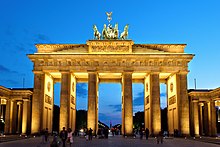This article needs additional citations for verification. (February 2010) |
A nonbuilding structure, often referred to simply as a structure, is any built structure that is not a building, i.e. not designed for continuous human occupancy. The term is particularly used by architects, structural engineers, and mechanical engineers to distinguish load-bearing structures not designed for continuous human occupancy.[1]









Examples
edit- Aerial lift pylons
- Avalanche dams
- Barriers[2]
- Beehive stone
- Blast furnaces
- Boat lifts
- Brick kilns
- Bridges[3] and bridge-like structures (aqueducts, overpasses, trestles, viaducts, etc.)
- Bus stops
- Canals
- Carports
- Chimneys and flue-gas stacks
- Coke ovens
- Communications towers
- Conservatories
- Covered bridges[3]
- Dams
- Docks
- Dolphins
- Driveways
- Electricity grids
- Elevators
- Fountains
- Ferris wheels
- Ferry slips
- Flumes
- Footpaths
- Fortifications
- Fractionating towers
- Garden
- Gates[2]
- Granaries
- Greenhouses
- Hayracks
- Hay barracks
- Headframes
- Infrastructures
- Landmarks
- Marinas
- Monoliths
- Megaliths
- Memorials
- Mounds
- Offshore oil platforms (except for the production and housing facilities)
- Oil depots
- Oil platforms
- Piers[3]
- Pitch
- Pyramids
- Radio masts and towers
- Railroads
- Ramadas
- Retaining walls
- Roads
- Roller coasters
- Sheds
- Ski lifts
- Silos[3]
- Storage tanks
- Street lights[2]
- Street signs[2]
- Swimming pools[3]
- Structures designed to support, contain or convey liquid or gaseous matter, including
- Cooling towers
- Distillation equipment and structural supports at chemical and petrochemical plants and oil refineries
- Tank farms
- Thoroughfares
- Tombs
- Towers of some types
- Tramways and aerial tramways
- Transmission towers
- Triumphal arches
- Tunnels
- Underwater habitats
- Water towers[3]
- Wharves[3]
- Windmills
Exceptions
editSome structures that are occupied periodically and would otherwise be considered "nonbuilding structures" are categorized as "buildings" for life and fire safety purposes:[citation needed]
- Aviation control towers
- Cruise ships
- Factories
- Kiosks
- Lighthouses
- Outhouses
- Power stations
- Refineries
- Warehouses
See also
editReferences
edit- ^ International Code Council (2003). 2003 International Building Code. International Code Council. ISBN 1-892395-79-7.
- ^ a b c d Prasad, Deo K.. Designing with solar power: a source book for building integrated photovoltaics (BiPV). Mulgrave, Vic.: Images ;, 2005. Print.
- ^ a b c d e f g Kunreuther, Howard, and Richard J. Roth. Paying the price the status and role of insurance against natural disasters in the United States. Washington, D.C.: Joseph Henry Press, 1998. Print.